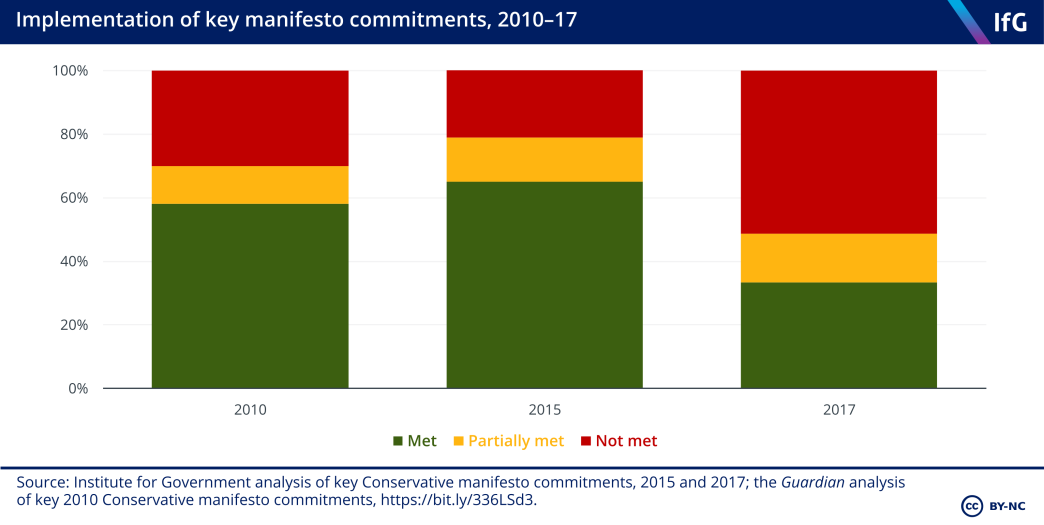Manifestos still matter even though their promises aren't being delivered
The publication of party manifestos is a big moment in a general election campaign. Parties set out their plans for running the country. Policies are
As parties prepare to publish their manifestos for government, Emma Norris asks whether they still have a significant role to play in the political process.
The publication of party manifestos is a big moment in a general election campaign. Parties set out their plans for running the country. Policies are explained. Slogans are restated.
Manifestos are a "party’s contract with the electorate" – outlining the competing visions and policies that make up their respective programmes for government. But do they actually matter?
Minority governments and the Brexit effect have made it hard to deliver manifesto promises
Our analysis shows a large number of promises from recent manifestos have not been delivered. Of 39 key commitments from the Conservatives' 2017 manifesto, we found only a third had been implemented, or were on track to being implemented.

There are a number of reasons manifesto pledges appear to be faring badly. One is the recent spate of hung parliaments. A party without a majority will need the support of others to implement its plans. Theresa May’s government was forced to abandon commitments, including replacing the pension triple lock with the double lock, as the price of the Democratic Unionist Party’s support. In 2010, the Liberal Democrats pledged in their manifesto to scrap tuition fees for undergraduates by 2016, before voting to increase fees as a member of the coalition government. Without a majority, parties will necessarily downgrade all but their most important or achievable pledges.
The number of elections in recent years is another reason. In 2005, the Labour government had already been in power for eight years. It had both the time to work way through its manifesto pledges and the stability to deliver on them. David Cameron left office just over a year after the publication of the Conservatives' 2015 manifesto. Theresa May had two and a half years to implement the 2017 version.
But perhaps the biggest recent factor is Brexit, which helps to explain why the 2017 Conservative manifesto was least successful, even when allowing for May’s short term of office. Some commitments, such as seeking "a deep and special partnership with the European Union", have been left unmet because of the difficulties of delivering Brexit.
In other cases, Brexit has drastically reduced the bandwidth government has to make progress on complex domestic issues: the social care green paper, for example, was delayed five times.
Manifesto promises and policies are not always properly thought through
The deeper concern should be the frequency with which manifesto pledges get shelved or delayed when they meet the reality of government.
This can happen when manifestos contain conflicting promises or when policy commitments prove incompatible with each other. While several 2017 funding and tax pledges have been honoured – such as increasing the overall schools budget by £4 billion, not increasing VAT and raising the income tax personal allowance – these were not consistent with staying on course to balance the budget by 2025
Missed commitments can also be down to poor policy development, as in the case of the 2015 Conservative commitment to social care reform and the 2010 origins of Universal Credit. A failure to sufficiently understand how a policy can be implemented, how it will affect citizens or how it interacts with other policies can all too easily lead to that policy getting knocked off course. Both Margaret Thatcher in 1979 and Tony Blair in 1997 largely managed the balance between sounding credible, while avoiding the kind of detail that would tie their hands too closely in office.
The presentation and delivery of manifestos is still important
Manifestos still matter. Particularly during the campaign itself. They do not affect voting intention as much as the party’s core values or citizens’ views about the leader, but how they are launched, how they are received, and how their policies stand up to scrutiny can seriously affect the tone of media coverage – and, in turn, shift public opinion. The 2017 social care debacle, and Theresa May’s insistence that “nothing had changed” even as the party rowed backwards from a manifesto policy, was a classic example.
Once in power, parties might choose to point to manifesto achievements. Labour’s 2005 manifesto contained a two-page account of how the party felt it had delivered on its 1997 and 2001 manifestos. But rather than defend their records, most parties tend to use manifestos to focus on the future.
Manifesto commitments can also dictate the options available to ministers when in government. In 2017, then Chancellor Phillip Hammond scrapped plans to increase national insurance contributions for the self-employed after fears that breaking the pledge not to make tax rises would damage the Conservatives’ reputation. And breaking flagship manifesto commitments, such as the Liberal Democrat U-turn on tuition fees, can seriously affect a party’s standing in power and its future electoral prospects.
How much of the winning 2019 manifesto(s) is delivered will partly depend on whether or not there is a majority government. But all parties can increase the chances of successfully delivering manifesto promises by understanding how different promises interact, identifying red lines for negotiations with other parties and, most crucially, striking the balance between setting out a high-level case for a policy while leaving enough room for manoeuvre on the detail.
Compare and contrast the parties' pledges with our Manifesto Tracker
- Supporting document
- IfG-manifesto-promises-edit-0205b.pdf (PDF, 211.77 KB)
- Topic
- Policy making
- Keywords
- Government communications
- Publisher
- Institute for Government